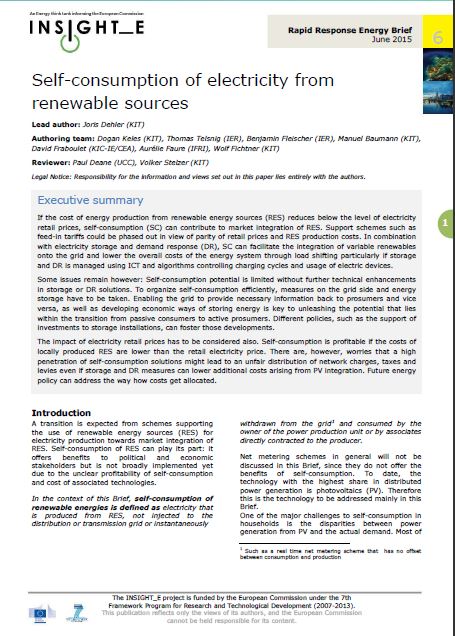Self-consumption of electricity from renewable sources

A report released by Insight_E, the European energy consortium specialised on energy policy research and analysis
Lead author: Joris Dehler (KIT). Authoring team: Dogan Keles (KIT), Thomas Telsnig (IER), Benjamin Fleischer (IER), Manuel Baumann (KIT), David Fraboulet (KIC-IE/CEA), Aurélie Faure (IFRI), Wolf Fichtner (KIT). Reviewer: Paul Deane (UCC), Volker Stelzer (KIT)
If the cost of energy production from renewable energy sources (RES) reduces below the level of electricity retail prices, self-consumption (SC) can contribute to market integration of RES. Support schemes such as feed-in tariffs could be phased out in view of parity of retail prices and RES production costs. In combination with electricity storage and demand response (DR), SC can facilitate the integration of variable renewables onto the grid and lower the overall costs of the energy system through load shifting particularly if storage and DR is managed using ICT and algorithms controlling charging cycles and usage of electric devices.
Some issues remain however: Self-consumption potential is limited without further technical enhancements in storage or DR solutions. To organize self-consumption efficiently, measures on the grid side and energy storage have to be taken. Enabling the grid to provide necessary information back to prosumers and vice versa, as well as developing economic ways of storing energy is key to unleashing the potential that lies within the transition from passive consumers to active prosumers. Different policies, such as the support of investments to storage installations, can foster those developments.
The impact of electricity retail prices has to be considered also. Self-consumption is profitable if the costs of locally produced RES are lower than the retail electricity price. There are, however, worries that a high penetration of self-consumption solutions might lead to an unfair distribution of network charges, taxes and levies even if storage and DR measures can lower additional costs arising from PV integration. Future energy policy can address the way how costs get allocated.
Download the full analysis
This page contains only a summary of our work. If you would like to have access to all the information from our research on the subject, you can download the full version in PDF format.
Self-consumption of electricity from renewable sources




